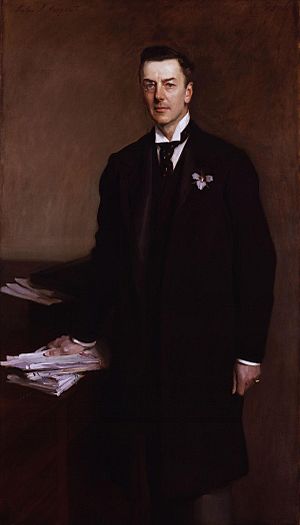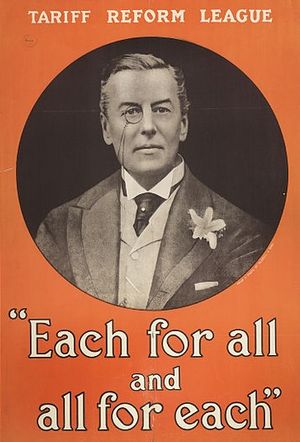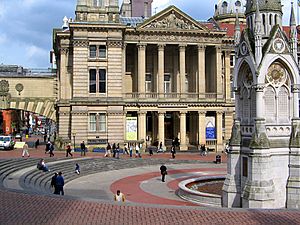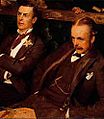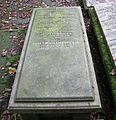Joseph Chamberlain facts for kids
Quick facts for kids
Joseph Chamberlain
|
|
|---|---|
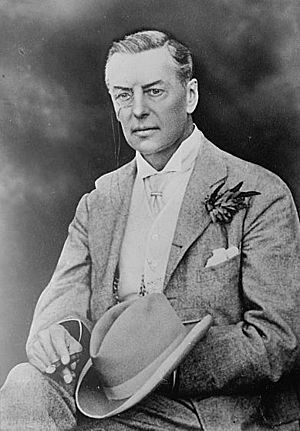
Joseph Chamberlain in 1909.
|
|
| Leader of the Opposition in the Commons | |
| In office 8 February 1906 – 27 February 1906 |
|
| Monarch | Edward VII |
| Prime Minister | Sir Henry Campbell-Bannerman |
| Preceded by | Arthur Balfour |
| Succeeded by | Arthur Balfour |
| Secretary of State for the Colonies | |
| In office 29 June 1895 – 16 September 1903 |
|
| Prime Minister | |
| Preceded by | The Marquess of Ripon |
| Succeeded by | Alfred Lyttelton |
| President of the Local Government Board | |
| In office 1 February 1886 – 3 April 1886 |
|
| Prime Minister | William Ewart Gladstone |
| Preceded by | Arthur Balfour |
| Succeeded by | James Stansfeld |
| President of the Board of Trade | |
| In office 3 May 1880 – 9 June 1885 |
|
| Prime Minister | William Ewart Gladstone |
| Preceded by | Viscount Sandon |
| Succeeded by | The Duke of Richmond |
| Personal details | |
| Born | 8 July 1836 Camberwell, Surrey, England |
| Died | 2 July 1914 (aged 77) Birmingham, England |
| Resting place | Key Hill Cemetery, Birmingham |
| Political party |
|
| Spouses |
Harriet Kenrick
(m. 1861–1863)Florence Kenrick
(m. 1868–1875)Mary Endicott
(m. 1888–1914) |
| Children |
|
| Education | University College School |
| Profession | Businessman |
| Signature | |
| Nicknames | "Our Joe", "Joseph Africanus" |
Joseph Chamberlain (born 8 July 1836, died 2 July 1914) was a very important British businessman and politician. He worked hard to make things better in cities and improve education for everyone.
He was a Member of Parliament (MP) from 1876 to 1914. He also served as the Colonial Secretary from 1895 to 1903. This job meant he was in charge of Britain's colonies around the world.
Joseph Chamberlain had two famous sons. His son Austen won the Nobel Peace Prize. His other son, Neville, later became the Prime Minister of the United Kingdom from 1937 to 1940.
Contents
Joseph Chamberlain's Early Life
Chamberlain was born in Camberwell, a part of London. His father owned a successful shoe company. Joseph was a very good student and won awards in French and mathematics.
He left school at 16 years old. He then started working as an apprentice in his father's company. When he was 18, he moved to Birmingham to work for his uncle's screw company. He worked there for 20 years, and the company became very successful because of his efforts.
Joseph Chamberlain's Early Political Career
Chamberlain was a Unitarian. Unitarians are Christians who believe that Jesus Christ showed people how to live. They often work to help society and make things better for others.
After the Industrial Revolution, Birmingham faced many problems. Many people were poor, and many men were not allowed to vote. In 1868, Chamberlain helped a liberal politician become the MP for Birmingham. In 1869, he started a group that pushed for free primary education for all children.
In November 1869, he became a member of the Birmingham City Council. He worked to make land cheaper for people living in the countryside. This made him very popular.
In 1873, he became the Mayor of Birmingham. As mayor, he bought the gas and water companies for the city. This meant people could have clean and safe water. He also created parks, built roads, opened schools and museums, and constructed new homes for poor families.
In June 1876, he became a Member of Parliament (MP) for Birmingham. In Parliament, he worked to bring together MPs who wanted big changes. His work helped William Ewart Gladstone become Prime Minister in 1880. Chamberlain often spoke about the importance of education in Parliament.
Joseph Chamberlain in Government
In 1880, Chamberlain became the President of the Board of Trade. This meant he was a government minister in charge of improving trade. He helped create laws that allowed other cities to buy private companies, just as he had done in Birmingham.
He also worked to make rents cheaper in Ireland. At that time, Ireland was a British colony. Many people in Ireland wanted their own parliament, but Chamberlain and many others disagreed strongly. Chamberlain also supported trade unions, which helped workers. However, he warned against socialism, saying it could cause problems between different social classes.
In 1885, Lord Salisbury, a Conservative politician, became Prime Minister. Chamberlain was no longer in the government. The Conservative government made some changes that Chamberlain liked, including free education for all children.
Chamberlain and many other liberals disagreed with their own Liberal Party about Ireland. So, Chamberlain started a new party called the Liberal Unionists. From 1886, the Liberal Unionists worked with the Conservatives against the Liberal Party. However, Chamberlain was not part of the government during this time.
Joseph Chamberlain as Colonial Secretary
In June 1895, Chamberlain became the Colonial Secretary. This meant he was in charge of all British colonies. Many European countries, like Germany and France, were becoming stronger. Chamberlain wanted all countries in the British Empire to work together. He also wanted Britain to take control of more land in Africa.
He helped build a railway along part of the Niger River. This helped the British Royal Niger Company grow. This land, along with the area of Sokoto, became modern Nigeria in 1901.
Chamberlain also wanted Britain to control South Africa. He asked for more British soldiers to be sent there. He also asked many British colonies to help, and in return, he helped Australia get its own constitution. The Boers, who were Dutch farmers living in South Africa, did not want Britain to control their land. In 1899, they attacked the British. This started the Second Boer War.
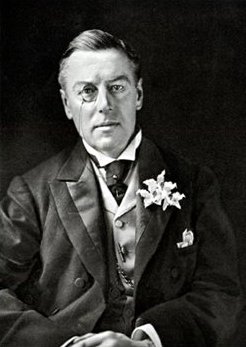
At first, Britain struggled to fight the Boers. But by 1900, the British became stronger. In Autumn 1900, Britain had a General Election. Chamberlain asked people to vote for the same government (with Prime Minister Salisbury) to help win the war. Chamberlain was very popular, so many people voted for the government, and they stayed in power. Chamberlain also helped Winston Churchill become a Member of Parliament.
In May 1902, Britain won the Second Boer War. Chamberlain visited South Africa to try and improve the relationship between the two countries. Back in Britain, he also talked to Zionist Jews (Jews who wanted their own country). He discussed giving them land in Kenya. However, this plan never happened.
Chamberlain tried to make an alliance with Germany. When this didn't work, he created an alliance between France and Britain. This was called the Entente cordiale. It helped end hundreds of years of fighting between the two countries.
Joseph Chamberlain's Later Life
Chamberlain believed that countries in the British Empire should do business with each other to become strong. To do this, Britain needed to tax imports (goods from other countries). This idea was called Tariff Reform. The government disagreed with him, so Chamberlain resigned from the government. He then worked with other MPs to push for Tariff Reform.
In 1906, shortly after his 70th birthday, Chamberlain had a stroke. This made him very sick. He could not work as hard as before, so his son, Austen Chamberlain, who was also an MP, helped him. Joseph Chamberlain died from a heart attack on 2 July 1914.
The city of Birmingham changed a lot because of Chamberlain's work. Many places in Birmingham are named after him. The University of Birmingham, which he helped to start, has a clock tower named after him. Chamberlain Square in the center of Birmingham also has a memorial in his honor.
Images for kids
-
Chamberlain's third wife, Mary, by John Singer Sargent, 1902
-
Joseph Chamberlain and Arthur Balfour, 1895
-
Political cartoon by Joaquín Xaudaró featuring Kruger and Chamberlain (Blanco y Negro, 9 December 1899).
-
A 1901 cartoon of Joseph Chamberlain from Vanity Fair
-
Grave of Joseph Chamberlain and his first two wives, Harriet (d. 1863) and Florence (d. 1875), in Key Hill Cemetery, Hockley, Birmingham
-
Joseph Chamberlain in the Chancellor's robes of Birmingham University
See also
 In Spanish: Joseph Chamberlain para niños
In Spanish: Joseph Chamberlain para niños
 | William Lucy |
 | Charles Hayes |
 | Cleveland Robinson |


